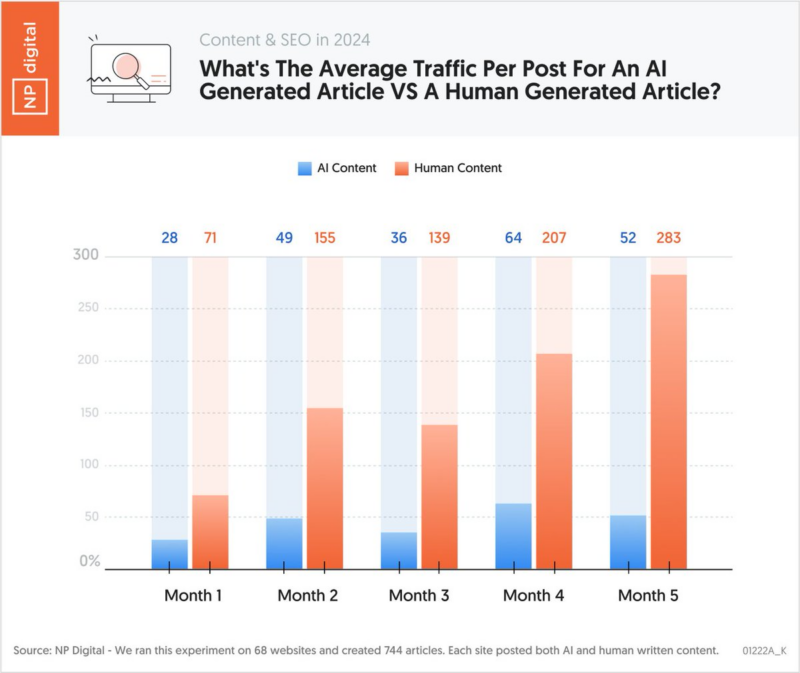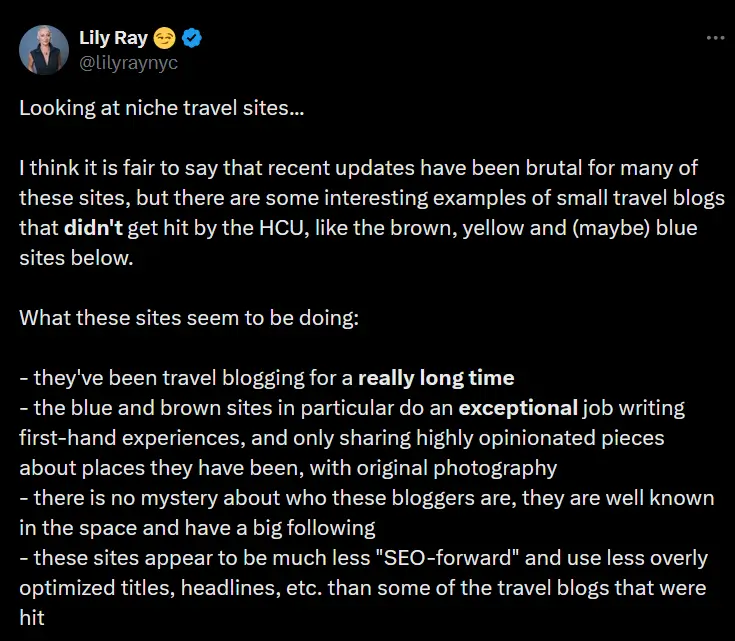In March 2024, Google announced a core update aimed at improving the quality of search results that has had a big impact on SEO for travel websites. The update prioritizes content that genuinely benefits and engages readers and moves away from SEO tactics that focus solely on search engine rankings.
This change has affected many travel websites but also revealed a surprising fact — small, niche travel blogs that emphasize creating authentic, user-centered content are unaffected. These sites have managed to stay visible and relevant in search results.
In this article, we’ll explore essential SEO strategies for travel websites adapting to Google’s new standards to ensure you continue to reach your audience effectively.
Google’s Update Shakes Up Niche Travel Sites: What to Know
Google’s Helpful Content Update aims to improve user experience. It rewards sites that truly meet their readers’ needs and penalizes those that focus more on SEO tricks than real value. The message is simple: make your audience’s experience better, and your site will do well.
This is especially important in the age of AI, where everyone is using tools like ChatGPT to produce regurgitated content that ultimately leads to poor traffic:

The standards Google uses to evaluate content include how original it is, how well-analyzed, and how useful. Sites that don’t meet these standards might see their search rankings drop.
On the other hand, sites that follow these rules can get better visibility and reach. This update has changed the game, making quality the key to success.
With these changes, niche travel sites need to adjust their strategies to succeed with Google’s new rules. Below are some tips to help your travel site meet the new expectations:
- Create content based on real experiences and insights, making it unique and valuable.
- Make sure all the information you provide is correct, current, and truly helpful for travelers planning their trips.
- Use original photos and personal stories to make a stronger connection with your audience and add authenticity.
- Avoid cramming in too many keywords. Instead, use relevant terms naturally to make your content easy to read and find in searches.
- Make sure your site loads quickly and works well on mobile devices, keeping both users and search engines happy.
Key Takeaway: Following Google’s Helpful Content Update by focusing on user experience and originality is not just smart SEO; it’s essential for niche travel sites that want to succeed in the long run.
Strategies for Niche Travel Sites to Thrive
If you want your niche travel site to do well after Google’s update, it’s super important to share your own travel stories, tips, and photos. This not only follows Google’s rules but also really connects with your readers. Making your content valuable and unique helps your site stand out.
Building trust and showing you’re an expert is key. You can do this by providing detailed guides, expert advice, and using content from your users. This makes your site a trusted place for travel info, improves your search engine ranking, and keeps readers coming back.
Google encourages content creators to focus on E-E-A-T: experience, expertise, authoritativeness, and trustworthiness.

Below are specific steps you can take to make sure your travel site meets Google’s new standards:
- Create content based on your own travel experiences to engage and add value for your readers.
- Boost your site’s trustworthiness by including expert opinions and in-depth, useful travel guides.
- Invite your audience to share their stories and reviews, creating a community-driven content collection.
- Write in a natural and easy-to-read style, avoiding too much focus on keywords.
- Make sure your website works smoothly and quickly on all devices.
Key Takeaway: To succeed in today’s SEO for travel websites, focus on real, personal content and establish a trustworthy and authoritative online presence.
Success Stories and Adaptation
Many travel websites have done well by following Google’s Helpful Content Update. These success stories show that focusing on good content and user experience can keep or even improve search rankings.
By putting the reader first, these sites have gained loyal followers and become go-to places for travel info:

Using social media and other online platforms to connect with your audience is key to supporting your SEO work. This not only brings more visitors but also creates a community around your brand. This approach works well with making helpful content, keeping your travel site seen in search results.
Below are simple tips to help your travel website do well with Google’s new rules:
- Keep your website updated with new travel stories and tips to keep content interesting.
- Share parts of your content on social media to get followers to visit your site for more details.
- Talk with your audience by answering comments and questions, on your site and social media.
- Use feedback from your community to make your content better and more suited to their needs.
- Keep up with SEO and Google updates to always improve your strategy and keep your site in line.
Key Takeaway: Doing well after Google’s Helpful Content Update means really connecting with your audience and consistently offering valuable, firsthand travel info.
Final Word on SEO for Travel Websites Essentials
It’s very important for travel websites to update their content to meet Google’s Helpful Content Update. Creating high-quality, user-focused content is key. This not only follows Google’s rules but also builds a reliable and interesting travel website.
As SEO continues to change, travel websites need to keep up and be ready to adapt. By doing so, they contribute to a better internet, where valuable experiences and stories are highlighted. This benefits both the people who create content and those who use it.
Related Video
If you’re ready to level up your travel website’s digital marketing, Single Grain’s marketing experts can help!👇
For more insights and lessons about marketing, check out our Marketing School podcast on YouTube.






